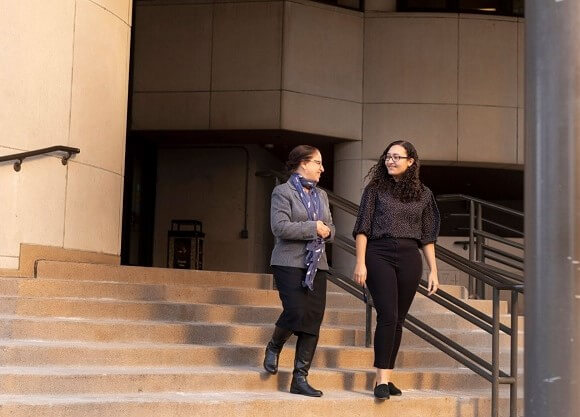
Law student works to exonerate wrongly convicted
December 19, 2019

December 19, 2019

“’Dead Man‘ had a profound impact on my life,” she said. “Everything was centered on law after that.”
Prison and post-conviction reform soon became two of Stephens’ passions. She has jumped at every opportunity to explore them at Quinnipiac Law — both in and out of the classroom. Last year, she partnered with an attorney, researching post-conviction nuances across each of the 50 states.
“The goal was to create a database that captured the differences in state treatment of post-conviction relief and compare them to Connecticut, and the American Bar Association standards,” Stephen said.
This perspective offered her valuable insight to her work with The Connecticut Innocence Project/Post-Conviction Unit, where she also interned from May 2018 to this past August. The national organization works to exonerate the wrongly convicted through DNA testing, as well as to pass laws and implement policies that prevent wrongful conviction. Its work has been featured in two Netflix docuseries: “Making a Murderer” and “The Innocent Man.” For Stephen, it was a dream opportunity.
“If I knew one thing coming into law school, it was that I wanted to get involved in the Innocence Project,” she said.
Stephen traveled to men’s prisons throughout Connecticut with the Innocence Project/Post-Conviction Unit. She worked on habeas briefs, which determine whether a client’s incarceration is lawful, worked on several parole packages and researched lengthy case histories in the hopes of finding something that could potentially lead to new trials.
“In our clients’ minds, we were holding their lives in our hands,” Stephen said.
Stephen said most of the clients she met were poorly educated, came from disadvantaged backgrounds and suffered from some form of mental illness. Many were brought up to view violence as a necessity and doing prison time as a rite of passage, she said. Still, they had chosen to devote their incarceration to positive pursuits, earning high school diplomas and college degrees, and learning skills such as woodworking and cooking.
“Despite their grim settings and circumstances, they were determined to unlock the best versions of themselves,” Stephen said.
Likewise, Stephen found the best version of herself as a lifeline for people in such circumstances. Her steadfast commitment to them was an inspiration to Associate Professor Carolyn Wilkes Kaas, who also serves as the associate dean of experiential education at the law school.
“Kayla consistently went above and beyond in the pursuit of proving that her clients were innocent,” said Kaas. “She is a crusader who will not stop working for justice, and I admire her tenacity.”
Stephen was selected for the inaugural Thomas J. Ullmann Fellowship in August, which is offered to outstanding law students interested in becoming public defenders. It’s named in honor of Tom Ullmann, the former chief public defender at the Superior Court of New Haven who taught at Quinnipiac Law and passed away last year. Ullmann was lauded during his lifetime for his legal prowess and for treating clients with dignity and respect.
“He was a remarkable, one-of-a-kind lawyer,” Stephen said. “It’s an absolute honor to be working under his name, in the very office he directed.”
Once again, Stephen found herself working with people accused of severe and often violent crimes. She assisted with their public defender applications and attended their arraignments at the New Haven County Courthouse. In these emotionally loaded situations, Stephen knew how to look beyond the headlines and not pass judgment, with the presumption of innocence still in effect. Beth Merkin, the supervisor of the New Haven Public Defender’s Office is excited to have the Quinnipiac law student join her team.
“Kayla’s commitment to our clients and to the important mission of public defense became immediately clear,” said Merkin. “Tom’s legacy is carried forward through this great fellowship opportunity.”
After she graduates in May and passes the bar exam, Stephen plans to become a public defender, continuing post-conviction work and educating people on prison and sentencing reform.
“I found a community of people at Quinnipiac who challenged me to be better, do better and seek better — and I want to espouse that same energy with everyone I meet,” she said.
Quinnipiac Today is your source for what's happening throughout #BobcatNation. Sign up for our weekly email newsletter to be among the first to know about news, events and members of our Bobcat family who are making a positive difference in our world.
Sign Up Now